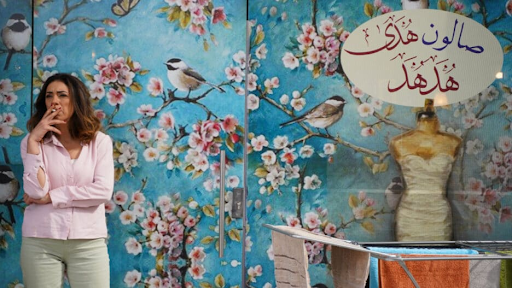‘Huda’s Salon’ is a fearless statement on women’s oppression
Director Abu-Assad writes a complex, gripping thriller about feminism

March 31, 2022
A young mother, Reem, complains about her suspicious husband while she relaxes in a salon chair. Huda, the owner of the salon, whines about how social media is ruining the lives of her clients. Suddenly, after taking a sip of her coffee, Reem falls unconscious.
Huda (Maisa Abd Elhadi) works for the Isreali Secret Service, and with the help of other agents, she drugs women and photographs them in disturbing positions for blackmail. After Reem (Manal Awad) regains consciousness, she is told to return home and become an informant for the Isreali government. If she doesn’t, she risks being publicly humiliated and divorced.
“Huda’s Salon” ties together military occupation and a significantly male-dominated culture. By bringing both together, the film successfully showcases the fear women live in.
As the story unfolds, the focus switches between two separate narratives: Reem, back in her apartment, trying to retain a sense of normalcy, and Huda, who is caught by Palestinian resistance and interrogated. Between the increasingly terrified Reema and the unnervingly calm Huda, the movie is extremely tense. On top of that, it becomes clearer that the life Reem is living is another version of Huda’s former life. Abu-Assad strategically includes glances, gestures, and lines which make both of the characters echo each other.
The script and writing are incredibly well written. As Reem searches for a way to get out of her horrible situation, she finds herself isolated. Her husband doesn’t believe her, her friends reject her, and, because she’s done no work for the Israelis, they give her no protection. In a doctor’s office, Reem overhears a woman talking about how she won’t tell her husband about her breast cancer in fear of him divorcing her. Each one of these scenes makes the audience realize that women are oppressed everywhere by everyone, regardless of the circumstances.
One of my only issues with the film is the editing and the cinematography. The plot is based on real life events, however the cinematographers make it feel like an on-stage play. In scenes where Reem is pacing room to room in her home, the camera follows her and her increasingly fast heartbeat can be heard. It made those scenes feel like something out of a horror film, but those scenes were short lived and felt unnecessary.
The slow-burning frustration of the main characters continues to build and build. Although Reem and Huda are brought together through bitter circumstances, they both suffer through the same patriarchal issues in an unruly part of the world. The construction, writing, and aesthetic of “Huda’s Salon” is dramatic, the plot is expertly paced, and the actors give breathtaking performances.







